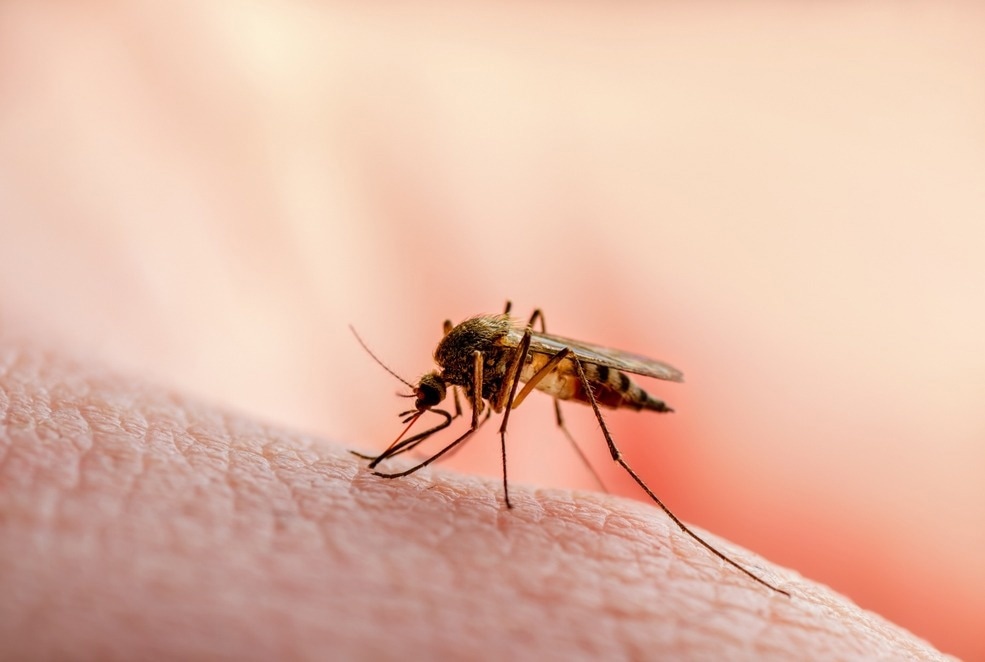A group of researchers led by Weill Cornell Medicine, New York-Presbyterian, and National Institutes of Health (NIH) investigators has discovered an unusual type of antibody that, even at extremely low concentrations, neutralizes the Zika virus and renders the virus infection undetectable in preclinical models.
 Close up image of a mosquito. Image Credit: Shutterstock
Close up image of a mosquito. Image Credit: Shutterstock
This finding could pave the way for the creation of treatments to shield infants from the potentially fatal effects of the Zika virus because the virus can cause birth defects when transmitted from a pregnant person to their fetus.
Researchers used blood cells taken from Zika-infected pregnant women to isolate an ultrapotent immunoglobulin M (IgM) antibody, a five-armed immune protein that binds to the virus, in their study, which was published on November 18th, 2022 in Cell.
Researchers found that in mice experiments, the antibody not only shielded the creatures from otherwise fatal infections but also suppressed the virus to the point where it could not be found in their blood.
However, co-senior author Dr Sallie Permar, the Nancy C. Paduano Professor in Pediatrics, chair of pediatrics at Weill Cornell Medicine, pediatrician-in-chief at NewYork-Presbyterian/Weill Cornell Medical Center, and NewYork-Presbyterian Komansky Children’s Hospital, predict that this situation will inevitably change.
Chief of the Translational Immunobiology Unit at the Laboratory of Infectious Diseases at the National Institute of Allergy and Infectious Diseases (NIAID), a division of the National Institutes of Health (NIH) Dr Mattia Bonsignori is the study co-senior author.
The important thing is that we have got to be ready for another outbreak of Zika.”
Dr Sallie Permar, Co-Senior Author and Nancy C. Paduano Professor in Pediatrics and Chair of Pediatrics, Weill Cornell Medicine
Doctors are unable to provide patients with any approved vaccines or treatments at this time. Dr Permar believes that this antibody has the potential to close that gap with additional studies.
Dr Permar added, “There are two potential ways it could be used: To quickly reduce levels of Zika in the blood of pregnant people who have become infected, or as a preventative measure given to those at risk of contracting the virus during an outbreak.”
The Zika virus, which is spread by infected Aedes aegypti mosquitoes, typically only affects adults with a minor illness. However, infection with the Zika virus during pregnancy can result in severe birth defects, such as abnormally small heads and brain damage in the offspring.
Researchers in Brazil, led by co-authors Dr Reynaldo Dietze of Global Health and Tropical Medicine and the Federal University of Esprito Santo, and Dr Camila Giuberti, also of the Federal University of Esprito Santo, gathered blood samples from women who were pregnant and had infections during a Zika outbreak that started in 2015.
Since they believed these patients could have antibodies that could prevent the congenital infection, the team chose to concentrate on women who had contracted Zika but had given birth to babies who appeared healthy.
One of these patients gave birth to an infant who appeared to be healthy despite having Zika in their blood for an unusually long time—nearly two months. The research teams discovered that their B cells produced an IgM antibody with a potent ability to stop viral particles from invading cells.
The team was led by first author Dr Tulika Singh, a former graduate student at Duke University Medical Center, where Dr Permar’s lab was located for a part of this study. She is currently a postdoctoral fellow at the University of California, Berkeley.
The fact that this antibody, known as DH1017.IgM, belongs to a type of antibody that is typically weaker and less developed and is produced early in an infection surprising the investigators. But in this instance, the antibody’s potent action was dependent upon it being an IgM antibody.
The researchers found that multiple arms could latch onto a viral particle at once when they looked at its molecular structure when binding to the virus. According to the results, IgM antibodies may be particularly effective at defending against the Zika virus and possibly other viruses.
The researchers intend to start evaluating the antibody’s safety and how well it can stop transmission to a fetus in additional preclinical models to develop it into a therapy. Dr Permar emphasized the need for pregnant women to be included in human studies for new preventive treatments for Zika after recalling how they were excluded from COVID-19 vaccine trials.
Dr Permar added, “Pregnant people are the exact population that needs vaccines or immunotherapies for Zika. It is crucial to get anti-Zika vaccines and therapies that are safe in pregnancy rolled out as soon as there is evidence of an outbreak.”
Source:
Journal reference:
Singh, T., et al. (2022). A Zika virus-specific IgM elicited in pregnancy exhibits ultrapotent neutralization. Cell. doi.org/10.1016/j.cell.2022.10.023